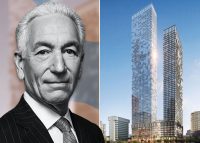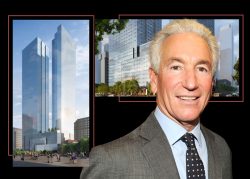Groundbreaking ceremonies involve snapping photos of executives and politicians throwing dirt into the air in a manner that in no way moves a project forward.
But the one held for Kushner Companies’ One Journal Square in Jersey City on Thursday had an extra layer of symbolism: It was the culmination of years of litigation, project redesigns and a repaired relationship with City Hall.
The two residential rental towers will rise 64 stories and 758 feet, making it one of New Jersey’s tallest. The nearly $1 billion project will include 1,723 apartments and 40,000 square feet of retail, occupied by Target.
The project is across the street from the Journal Square PATH Station and near the Loew’s Theatre, which is undergoing a $72 million restoration that will turn the local icon into a 3,000-plus-seat concert venue.
Kushner expects to complete the residential towers in 2026. CEO Laurent Morali indicated that AIG and Related Fund Management provided more than $500 million in construction financing.
Under a large white tent set up on the site, with the backdrop of a construction excavator and drilling rigs, Kushner executives referred to the project as the “new center of gravity” of Journal Square, a neighborhood that has seen an explosion of development over the past decade.
Mayor Steve Fulop referred to the towers, the first of which will have 900 units, as the city’s “most significant” in terms of its impact on the Jersey City skyline.
“We are always thinking long-term,” Kushner Companies President Nicole Kushner Meyer said in an interview. “We identified this site many years ago as a great growth opportunity, with great accessibility to transportation, and we’re in this for the long run.”
One Journal Square is more than a decade in the making. Kushner and then-partner KABR Group scooped up the site in 2015 for $27 million. It had sat vacant since 2009, after previous plans for two towers failed to move forward, according to the Jersey Journal.
But Kushner soon ran into trouble of its own. Its May 2017 bid for $150 million in construction financing from EB-5 investors raised conflict of interest concerns, given the family’s connections to the Trump administration. Around that time, WeWork quietly backed out of its agreement to anchor the project, where it had planned to occupy 110,000 square feet.
Local politics also became an issue. The Fulop administration rejected Kushner’s application for a 30-year tax abatement and threatened to block the project, accusing the company of missing development deadlines and failing to pay municipal fees. Kushner sued the city, alleging that “anti-Trump bias” guided the mayor’s decisions.
Read more



At the time, activists organized protests outside Trump- and Kushner-owned properties in the modest New Jersey city.
The parties reached a settlement in October 2020 and resumed the project, which KABR has since left.
Periodically at the groundbreaking, executives and the mayor alluded to the legal battles that had prevented the project from moving forward.
“Charlie, we did it,” said CEO Laurent Morali, looking at the Kushner patriarch, who sat in the audience, with his wife, Seryl.
Fulop, reflecting on his nine years of interaction with Charles Kushner, noted that “challenges around economics, around relationships” jeopardized the project.
“Charlie … can be a very good friend, and a very, very formidable adversary,” the mayor said. “The reality is, that when we cooperate and work together, the best things happen.”
The founder of the development company and father to Nicole and Jared Kushner once referred to Fulop as “just another New Jersey asshole politician.” But the two were seen chatting ahead of the event and hugged afterward.
“It’s been up and down, but I think ultimately healthy relationships have these sorts of conversations where people don’t always agree, and it ultimately creates a better product,” Fulop said in an interview.
Asked about accusations that previous decisions were influenced by dislike of the Trump administration, he added, “It’s all irrelevant at this point. We’re here.”
